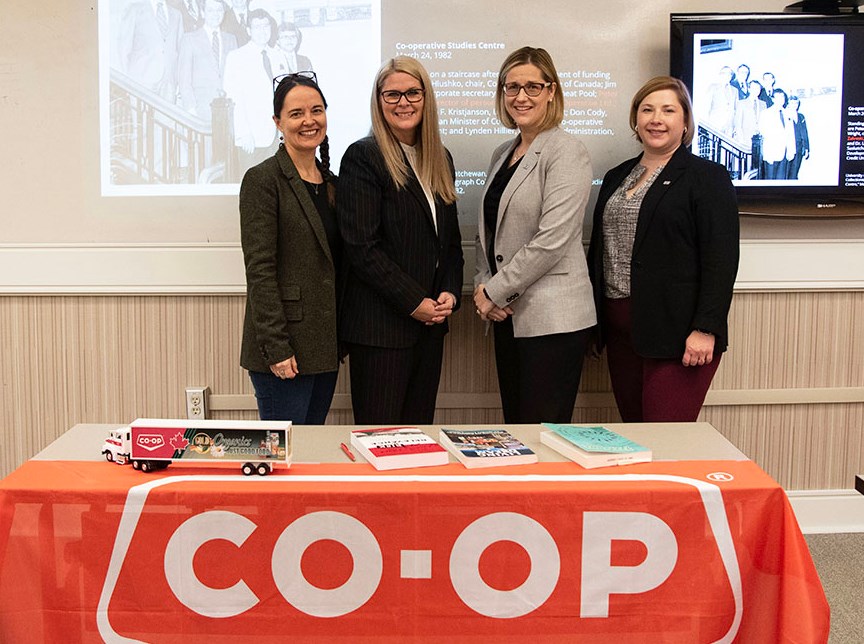SASKATOON — For the past 40 years, the Canadian Centre for the Study of Co-operatives (CCSC) has been a cornerstone in advancing interdisciplinary research and education about co-operatives at the University of Saskatchewan (USask), across Canada, and around the world.
Established in 1984, the centre’s origins trace back to a tripartite agreement among the co-operative sector (Federated Co-operatives Limited, Credit Union Central of Saskatchewan, and the Saskatchewan Wheat Pool), USask, and the Government of Saskatchewan to fund the first in Canada—and among the first in the world—research and education centre dedicated to co-operatives.
The CCSC was also a leader in how it went about accomplishing its mission. From the beginning, the co-operative sector and its academic partners realized they needed a research centre that was committed to interdisciplinarity, a concept that did not have the same cache it does today. Working against the tide, the CCSC had assembled a team of USask scholars from disciplines as varied as economics, history, sociology, marketing, law, and beyond who were committed to learning from each other, engaging in vigorous critical inquiry, and sharing what they learned with other scholars and the co-operative sector.
The CCSC’s interdisciplinarity and spirit of free critical inquiry have served it well, allowing the centre to provide the co-operative sector, policymakers, and researchers with data, conceptual tools, and practical analysis to understand co-operative organizations and initiatives, and to position them, where sensible, as solutions to evolving modern social and economic needs.
“Our mission is simple. We develop research and provide educational opportunities about co-operatives that are academically rigorous, real-world relevant, and designed for policy impact,” said CCSC Director Dr. Marc-André Pigeon (PhD). “Our vision is a world that is more democratic, grounded in community, and sustainable.”
The CCSC has repeatedly delivered on its mission. In the early 2000s, its affiliated faculty obtained one of the largest Social Sciences and Humanities Research Council of Canada (SSRHC) grants at the time to study the emergence of the social economy sector in Canada.
Later, in the mid-2010s and with the support of FCL, it undertook a two-year study called the “” which led to the creation of Co-operatives First, a non-profit organization whose mission is to foster and support co-operative development in rural and Indigenous communities in Western Canada.
More recently, and building on these experiences, it completed a major study into Build Up, a Saskatoon social enterprise delivered by Quint Development that employs people who have been in-and-out of the criminal justice system. This work has opened up new funding and expansion possibilities for the city’s social enterprise sector.
The CCSC also continues to advance education and training opportunities for co-operators.
In 2014, CCSC introduced the , designed to help mid-career professionals improve their understanding of the third sector.
In 2020, the centre also developed the Advanced Co-operative Governance Program—a first-of-a-kind program that provides governance training to board directors from a uniquely co-operative perspective and an official designation (Co-opD.D) issued by the Johnson Shoyama Graduate School of Public Policy (JSGS). Since then, 102 directors across Canada have graduated from the program, enhancing their understanding of co-operative governance.
While CCSC’s scope is national and its reach global, it remains strongly rooted in Saskatchewan, driven by issues that focus on the local co-operative sector. Currently, the centre is undertaking research on the impact of health care co-operatives, the future of local credit unions, and the role co-operatives can play in building inclusive communities across urban and rural boundaries.
Marking its 40th year this fall, the CCSC reflects on its past achievements and eyes the future with optimism.
“We are using our 40th anniversary to draw inspiration from the past and take that raw material to think courageously about how co-operatives can play an even bigger role in the future,” Pigeon said. “Because we believe our world needs more democracy, more spaces where people have to face up to the fact that not everyone thinks like they do, and they still have to get along. And part of that process of looking back and forward is to recognize the visionaries in the co-operative sector, the university, and the province who embodied—and still embody—this commitment to the hard, shared work of democracy, who saw a need and, in the time-honoured tradition of Saskatchewan, got it done.”
On November 21, the centre will commemorate the milestone with a special event at the Diefenbaker Building, bringing together co-op practitioners, researchers, and partners to celebrate its ongoing legacy.
— Submitted by USask Media Relations




